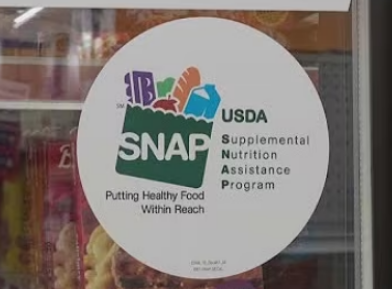Lawsuit filed against Trump Administration over SNAP benefit changes
- Replies 1
A legal clash is unfolding between a coalition of state attorneys general and the Trump administration over a directive many say crosses constitutional and ethical lines.
At the heart of the dispute is a federal order demanding detailed personal information on millions of low-income Americans receiving SNAP benefits.
Attorneys general from 19 states and Washington, DC, say the move compromises privacy, violates federal law, and could lead to broader government overreach. The administration, meanwhile, has refused to comment, citing pending litigation.
The US Department of Agriculture issued the directive as part of an effort under a Trump executive order to increase data-sharing between state and federal programs.
The order mandates that states turn over names, birth dates, addresses, and Social Security numbers of SNAP applicants and recipients.
Officials argue the data is necessary to identify and reduce fraud in a program that currently serves around 42 million people nationwide.
But state leaders are pushing back hard, saying the request is excessive, invasive, and potentially unconstitutional.

The coalition of 20 attorneys general filed a federal lawsuit Monday seeking an injunction to stop the data transfer.
The legal complaint also asks for a ruling that would restrict any sharing of SNAP data beyond core administrative functions of the program.
New York Attorney General Letitia James said, “We will not allow this lifesaving program to be illegally used to hunt down immigrants and their families.”
California Attorney General Rob Bonta added, “It’s a bait-and-switch of the worst kind,” noting that recipients provided their data to get help feeding their families—not to be surveilled.
Also read: The USDA’s latest move—how it could shake up your food habits and grocery list
The USDA has said the move is part of a broader modernization effort, with Agriculture Secretary Brooke Rollins stating in May: “President Trump is rightfully requiring the federal government to have access to all programs it funds, and SNAP is no exception.”
Rollins added that the request is “one of many steps to ensure SNAP is preserved for only those eligible.” Critics argue the administration's silence since the lawsuit was filed suggests concern over legal exposure. But proponents insist that without full visibility into who’s receiving benefits, the program is vulnerable to abuse.
Earlier attempts to begin this data collection in May were halted after nonprofits and individual recipients filed for a temporary restraining order.
The USDA then paused the plan but reissued the directive with a firm July 30 deadline, reigniting legal tensions.
The latest lawsuit builds on earlier claims that the order violates the Privacy Act, the Paperwork Reduction Act, and the Constitution.
Legal observers say the case could be a critical test of limits on federal data collection under executive authority.
The list of states joining the lawsuit includes California, New York, Illinois, Michigan, Oregon, and 14 others, along with the District of Columbia. Kentucky Governor Andy Beshear’s office has also signed on as a plaintiff.
Also read: What SNAP changes could mean for your grocery budget—23 governors speak out
The lawsuit does not seek to dismantle SNAP itself but aims to protect sensitive data from what state leaders view as unauthorized access.
The USDA has declined multiple requests for comment, sticking to a consistent position of not addressing pending litigation.
Read next: New SNAP restrictions? Some groceries could soon be off-limits with food benefits

Are you concerned about how much data the federal government collects from state-run programs like SNAP? Drop your thoughts in the comments — we want to hear your take on privacy, oversight, and transparency.
At the heart of the dispute is a federal order demanding detailed personal information on millions of low-income Americans receiving SNAP benefits.
Attorneys general from 19 states and Washington, DC, say the move compromises privacy, violates federal law, and could lead to broader government overreach. The administration, meanwhile, has refused to comment, citing pending litigation.
The US Department of Agriculture issued the directive as part of an effort under a Trump executive order to increase data-sharing between state and federal programs.
The order mandates that states turn over names, birth dates, addresses, and Social Security numbers of SNAP applicants and recipients.
Officials argue the data is necessary to identify and reduce fraud in a program that currently serves around 42 million people nationwide.
But state leaders are pushing back hard, saying the request is excessive, invasive, and potentially unconstitutional.

Lawsuit filed against Trump Administration over SNAP benefit changes. Image source: 11Alive / YouTube
The coalition of 20 attorneys general filed a federal lawsuit Monday seeking an injunction to stop the data transfer.
The legal complaint also asks for a ruling that would restrict any sharing of SNAP data beyond core administrative functions of the program.
New York Attorney General Letitia James said, “We will not allow this lifesaving program to be illegally used to hunt down immigrants and their families.”
California Attorney General Rob Bonta added, “It’s a bait-and-switch of the worst kind,” noting that recipients provided their data to get help feeding their families—not to be surveilled.
Also read: The USDA’s latest move—how it could shake up your food habits and grocery list
The USDA has said the move is part of a broader modernization effort, with Agriculture Secretary Brooke Rollins stating in May: “President Trump is rightfully requiring the federal government to have access to all programs it funds, and SNAP is no exception.”
Rollins added that the request is “one of many steps to ensure SNAP is preserved for only those eligible.” Critics argue the administration's silence since the lawsuit was filed suggests concern over legal exposure. But proponents insist that without full visibility into who’s receiving benefits, the program is vulnerable to abuse.
Earlier attempts to begin this data collection in May were halted after nonprofits and individual recipients filed for a temporary restraining order.
The USDA then paused the plan but reissued the directive with a firm July 30 deadline, reigniting legal tensions.
The latest lawsuit builds on earlier claims that the order violates the Privacy Act, the Paperwork Reduction Act, and the Constitution.
Legal observers say the case could be a critical test of limits on federal data collection under executive authority.
The list of states joining the lawsuit includes California, New York, Illinois, Michigan, Oregon, and 14 others, along with the District of Columbia. Kentucky Governor Andy Beshear’s office has also signed on as a plaintiff.
Also read: What SNAP changes could mean for your grocery budget—23 governors speak out
The lawsuit does not seek to dismantle SNAP itself but aims to protect sensitive data from what state leaders view as unauthorized access.
The USDA has declined multiple requests for comment, sticking to a consistent position of not addressing pending litigation.
Read next: New SNAP restrictions? Some groceries could soon be off-limits with food benefits
Key Takeaways
- The Trump administration is facing legal action over a USDA directive requiring states to submit personal data on SNAP recipients, including names, birth dates, and Social Security numbers.
- A total of 20 state attorneys general have sued, arguing that the move violates privacy laws and could be used for immigration enforcement.
- The USDA maintains that the data is needed to prevent fraud and ensure only eligible individuals receive benefits.
- A court ruling could shape how the federal government accesses sensitive information in publicly funded programs going forward.






